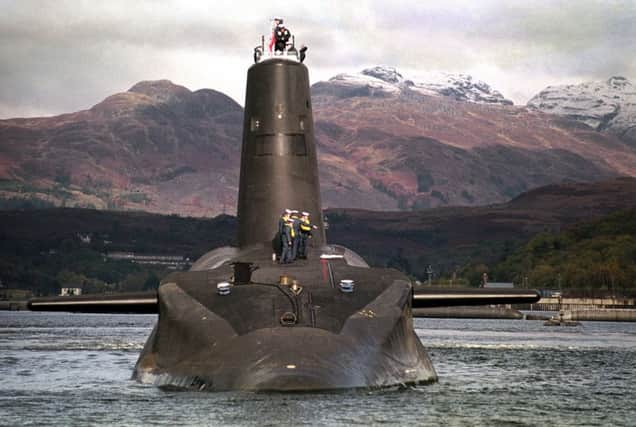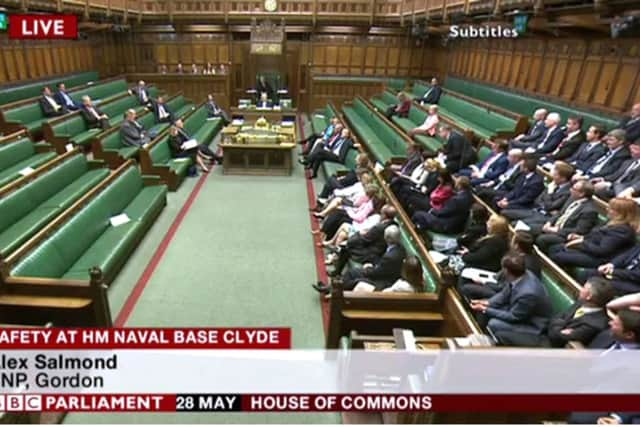No safety issues on Trident, says Michael Fallon


Mr Fallon told MPs today that a Ministry of Defence (MoD) investigation into claims made by William McNeilly had found they were either incorrect, the result of misunderstanding, or based on historic events.
The Defence Secretary said neither the operational effectiveness of the nuclear deterrent nor the safety of the public or submariners have been compromised.
Advertisement
Hide AdAdvertisement
Hide AdHowever, in his first House of Commons address since returning to Westminster, SNP MP and former first minister Alex Salmond said Mr Fallon’s explanation was an “insult” to the public’s intelligence.


Able Seaman McNeilly, 25, went absent without leave earlier this month after producing an 18-page report containing a series of claims about the Trident submarines based at Faslane on the Clyde.
He said there were fire risks and leaks on board and security checks were rarely carried out on personnel and contractors working on the submarines when they were docked.
He also alleged alarms were muted because they went off so often, missile safety procedures were ignored and top-secret information was left unguarded.
In a written ministerial statement, Mr Fallon said: “Having now completed our investigation, and having consulted with the appropriate regulatory and operating authorities, I can assure the House that neither the operational effectiveness of our continuous at sea deterrent nor the safety of our submariners or members of the public have been compromised.”
He said only one of Able Seaman McNeilly’s claims, that e-cigarettes are being used inside the vessels, needs to be investigated further but there is “clear evidence” that their use does not put the safety of the boats at risk.
Mr Fallon said: “Most of McNeilly’s concerns proved to be either factually incorrect or the result of mis- or partial understanding; some drew on historic, previously known, events none of which had compromised our deterrent capability and, where appropriate, from which lessons had been learned to develop our procedures as part of a continuous improvement programme.
“Only one of the allegations remains to be fully examined – that e-cigarettes were being used within the submarine.
Advertisement
Hide AdAdvertisement
Hide Ad“No independent corroboration of this has been found but even if it were true, there is clear evidence that their use did not put the safety of the boat at risk.”
Defence minister Penny Mordaunt said the allegations had been “thoroughly and methodically investigated” and found to be “utterly unjust”. She added that Able Seaman McNeilly had been released, faces no charges and as of Tuesday he has returned to duty as a serving member of the Royal Navy.
Mr Salmond said: “I would submit to this House that in terms of the crucial matter of safety which is clearly at stake here that the House, the public, deserve a better, more comprehensive explanation than the 500-word written statement issued by the Secretary of Defence today. That is an insult not just to this House, it is an insult to the intelligence of the general public.”
Mr Salmond condemned secrecy around leaks in a test reactor at Dounreay in Caithness, which were made public last year but which occurred in 2012.
He said the Ministry of Defence invoked “crown immunity” to stop news of the leaks, caused by small cracks in a prototype reactor deliberately run longer and harder than standard models to identify problems with the design before they emerged on the Vanguard-class submarines.
Mr Salmond said it prevented the Scottish Environmental Protection Agency from making information public in the same way as if there was a problem in a civil nuclear facility.
He added: “We are passed the stage where the invocation of crown immunity can conceal from the public for months and perhaps years nuclear incidents which may have a bearing on the safe operation of nuclear reactors in the Faslane base.”
Mr Salmond said 57 of Scotland’s 59 MPs would vote against the “main gate decision” on renewing Trident next year, adding that this should give ministers “pause for thought”.
Advertisement
Hide AdAdvertisement
Hide AdHe claimed: “The military value of this deterrent is non-existent. Its use would break international law. As a weapon of security it is a sign of insecurity.
“Given the political realities in Scotland, [Ms Mordaunt] and the government would be making a fatal mistake if they believe that the cost of this costly trumpery, this useless, expensive, unlawful and inherently dangerous military plaything is going to be tolerated by these benches, this party or this country for any longer.”
Ms Mordaunt said the allegations of carelessness and complacency were “utterly unjust” and insisted safety had not been compromised. She said Able Seaman McNeilly’s claims had not been dismissed by the MoD but “thoroughly and methodically” investigated.
She added: “The dedication of the Royal Navy in addressing those concerns, in keeping the deterrent safe and ensuring the capability’s security – any suggestion that there is somehow complacency to that is absolutely not the case.”